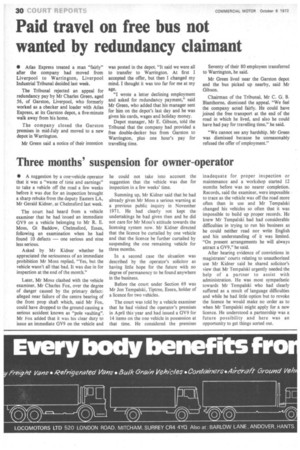Three months' suspension for owner-operator
Page 32

If you've noticed an error in this article please click here to report it so we can fix it.
• A suggestion by a one,-vehicle operator that it was a "waste of time and earnings" to take a vehicle off the road a few weeks before it was due for an inspection brought a sharp rebuke from the deputy Eastern LA, Mr Gerald Kidner, at Chelmsford last week.
The court had heard from a vehicle examiner that he had issued an immediate GV9 on a vehicle belonging to Mr R. E. Moss, Gt Baddow, Chelmsford, Essex, following an examination when he had found 10 defects — one serious and nine less serious.
Asked by Mr Kidner whether he appreciated the seriousness of an immediate prohibition Mr Moss replied, "Yes, but the vehicle wasn't all that bad. It was due in for inspection at the end of the month."
Later, Mr Moss clashed with the vehicle examiner, Mr Charles Fox, over the degree of danger caused by the primary defect: alleged near failure of the centre bearing of the front prop shaft which, said Mr Fox, could have dropped to the ground causing a serious accident known as "pole vaulting". Mr box added that it was his clear duty to issue an immediate GV9 on the vehicle and he could not take into account the suggestion that the vehicle was due for inspection in a few weeks' time.
Summing up, Mr Kidner said that he had already given Mr Moss a serious warning at a previous public inquiry in November 1971. He had clearly not kept the undertakings he had given then and he did not care for Mr Moss's attitude towards the licensing system now. Mr Kidner directed that the licence be curtailed by one vehicle and that the licence be further curtailed by suspending the one remaining vehicle for three months.
In a second case the situation was described by the operator's solicitor as having little hope for the future with no degree of permanency to be found anywhere in the business.
Before the court under Section 69 was Mr Jon Tempalski, Tiptree, Essex, holder of a licence for two vehicles.
The court was told by a vehicle examiner that he had visited the operator's premises in April this-year and had issued a GV9 for 14 items on the one vehicle in possession at that time. He considered the premises
inadequate for proper inspection or maintenance and a workshop started 12 months before was no nearer completion. Records, said the examiner, were impossible to trace as the vehicle was off the road more often than in use and Mr Tempalski changed his vehicles so often that it was impossible to build up proper records. He knew Mr Tempalski had had considerable difficulties in trying to run his business as he could neither read nor write English and his understanding of it was limited. "On present arrangements he will always attract a GV9," he said.
After hearing evidence of convictions in magistrates' courts relating to unauthorized use Mr Kidner said he shared solicitor's view that Mr Ternpalski urgently needed the help of a partner to assist with administration. He was most sympathetic towards Mr Tempalski who had clearly suffered as a result of language difficulties and while he had little option but to revoke the licence he would make no order as to when Mr Tempalski might apply for a new licence. He understood a partnership was a future possibility and here was an opportunity to get things sorted Out.






































































































